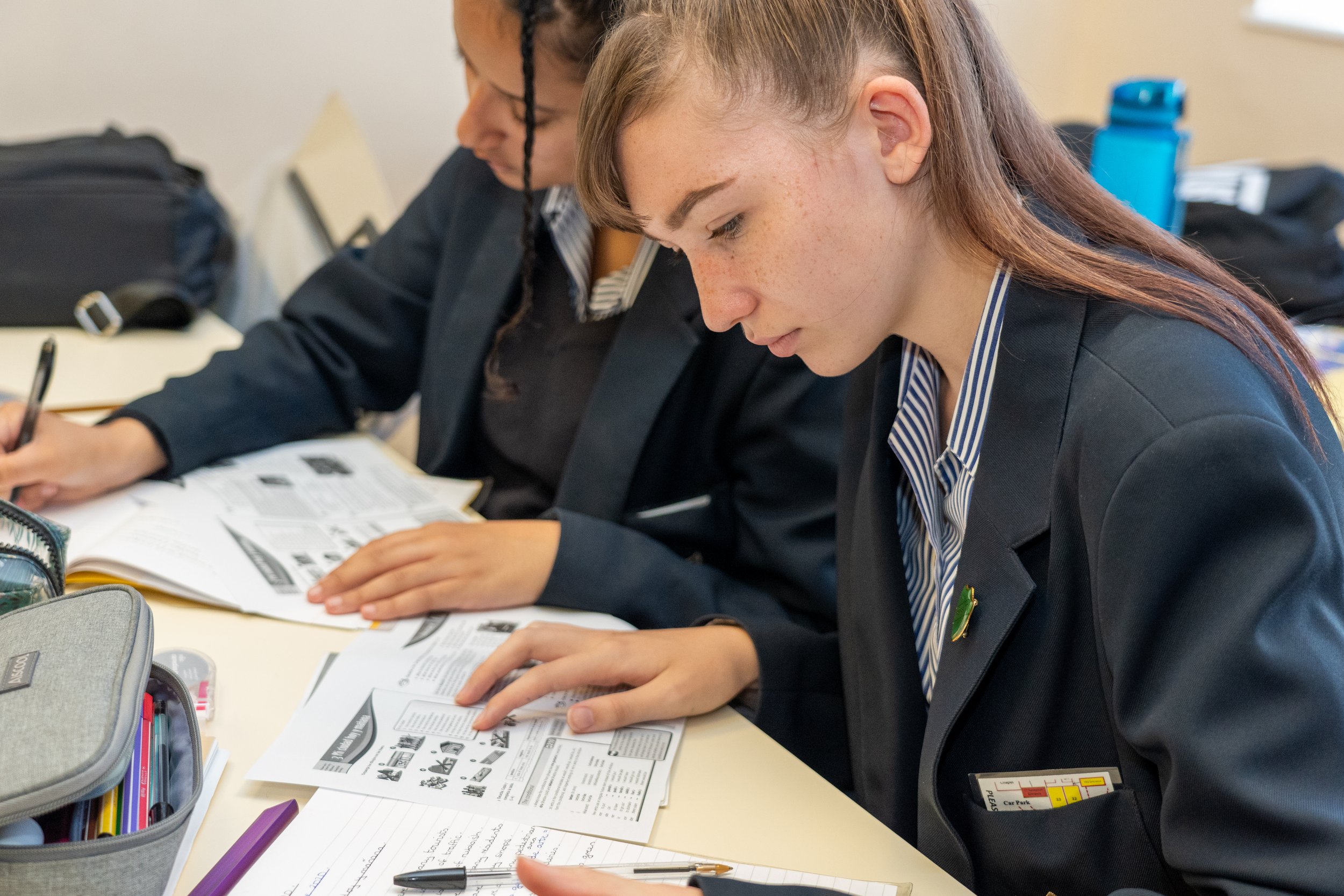
GEOGRAPHY
Overview Of The Subject
Geography is not only up-to-date and relevant, but it is one of the most exciting, adventurous and valuable subjects to study today. So many of the world’s current problems boil down to Geography and need the Geographers of the future to help us understand and manage them. Global warming, sustainable food production, natural disasters such as earthquakes and volcanoes, the spread of disease, the reasons for migration and the future of energy resources are just some of the challenges facing the next generation of Geographers. At Grays Convent High School, we want students to become global citizens and show a keen awareness of the Geography around them. Geography is everywhere and girls at GCHS develop a keen awareness and appreciation of the Geography around them.
Aims Of The Curriculum/Curriculum Intent
We have explored the topics studied and skills gained at Key Stage 2 as well as those covered at Key Stage 4 (GCSE level) and aimed to allow KS3 to facilitate a smooth transition across each Key Stage, alongside developing Geographical skills throughout years 7, 8, and 9. By doing this, KS3 Geography builds on and prepares students for the next stage of their education, training and employment, whilst also building their confidence in all areas of Geographical study.
The teaching and learning of Geography aims to develop knowledge, skills, concepts, values, and attitudes through an approach that sees Geography as an integral part of the whole school curriculum. Geography offers a unique importance in equipping pupils with key attributes needed for Key Stage 4 and beyond. As a department, we are aware that the secondary level can be the final experience of school Geography, therefore, we aim to ensure all students leave with the essential and necessary Geographical skills needed for all further educational and employment opportunities.
Pupils who need support in this subject are catered for in a number of ways. Within lessons, learning objectives are made clear to students, with key terms being identified and defined to allow students to use them with confidence within class discussions. Additionally, lessons are differentiated according to the students within them, allowing the appropriate level of support to be provided through classroom resources, while also allowing higher achieving pupils to be challenged in a variety of ways that will push them further.
Curriculum Content KS3
Year 7
At both the start and end of Year 7 we spend time teaching students the core values within geography, exploring the purpose of studying it.
Students look at specific key elements of Geography such as population and tourism to equip them with the fundamental knowledge and skills required to succeed in this subject.
Exploring different areas such as the British Isles and Africa enables them to develop their understanding of place and location.
Students are introduced to Geographical field studies at the end of the year, allowing them to practice the skills they have gained at the start of KS3.
What is Geography?
The UK Landscape
Africa
Settlement
Tourism
Geographical skills
Year 8
Begin to develop in-depth exploration of physical geography, putting it into context using various landscapes.
Bring geographical topics into day-to-day life through exploring climate change generally, and in relation to the environment around us.
Apply the knowledge gained in Year 7 by exploring more physical elements of the world around them.
Build on understanding of different areas around the world and start to deepen their Spatial awareness of the world’s countries using maps, specifically on the Middle East.
Earthquakes and Volcanoes
Nepal/New Zealand case study
The Middle East
Consuming Energy
Ecosystems and Rainforests
Climate Change
Year 9
Looking at the development of India allows students to explore the ideology that has been introduced to them in years 7 and 8, while giving them practice in looking at different styles of data and communicating their findings- a skill required at GCSE level
The study of coasts gives them an in-depth knowledge and understanding of the physical geography of areas and landscapes.
Students spend time this year building on interpretation and communication of knowledge that will be valuable in the years to come.
By preparing these students with the skills that they have been building on in previous years, not only will students who choose this subject at KS4 feel confident in their transition, but those that do not continue studying this subject past KS3 will have a good understanding of both physical and human geography that will aid them across the curriculum.
Developments in India
Mumbai: a Megacity
Coasts
Rivers
GCSE: The Evolving Human UK Landscape
Assessment
Within this key Stage we take the opportunity to assess students in a variety of different ways to develop particular skills that will be used at both KS4 and further ahead in their academic journey, such as exams, presentations, extended writing pieces, and independent research projects.
Students will begin Year 7 with a baseline test that indicates to teachers what the capabilities of each student are in this subject, as well as an idea of what topics girls have already explored at Key Stage 2. This baseline test has recently been developed and adapted to work in transition with the topics studied at Key Stage 2 within some of our key feeder schools, in order to make it appropriate and relevant for all students.
As students are in mixed ability classes in Geography, this is used as an opportunity to provide students with a multitude of assessment forms therefore playing to a variety of strengths. The aim is to keep assessments across Key Stage 3 relatively consistent in order to give pupils a routine of success, while still challenging them and encouraging them to progress. Within these assessments we include key concepts and objectives seen at KS4 in order to best prepare them for that transition in future years. As students move into Year 9, this focus on objectives seen at GCSE level become more apparent to give students more structure and guidance, as well as to simulate the expectations at the next Key Stage.
GCSE Geography
Aims Of The Curriculum/Curriculum Intent
The Geography specification gives students the opportunity to study for a GCSE that is engaging and relevant to today’s geographers, allowing students to explore the world, the issues it faces and their own place in it. Students are encouraged to make geographical decisions by applying their knowledge, understanding and skills to real life, 21st century people and environmental issues.
The course follows enquiries that encourage an investigative approach for each of the key issues. Students are encouraged to use their geographical and mathematical skills in order to support their answers.
Fieldwork is used to enforce, enlighten and underpin their classroom studies. The course develops students’ knowledge and understanding of place as well as UK and global issues throughout the two years.
Specification
Paper 1: Global Geographical Issues
1 hour 30-minute exam
37.5% of the qualification
94 marks
Key topics:
Topic 1: Hazardous Earth
Topic 2: Development dynamics
Topic 3: Challenges of an urbanising world
Paper 2: UK Geographical issues
1 hour and 30-minute exam
37.5% of the qualification
94 marks
Key topics:
Topic 4: The UK’s evolving physical landscape. At GCHS we focus on coastal landscapes
Topic 5: The UK’s evolving human landscape – including a Case Study on Stratford. (Students taking GCSE in 2021will not be required to undertake fieldwork)
Topic 6: Geographical investigations – including one physical fieldwork investigation and one human fieldwork investigation linked to Topics 4 and 5.
Paper 3: People and environment issues - making geographical decisions
1 hour and 30 minute exam
25% of the qualification
64 marks
Key topics:
Topic 7: People and the biosphere
Topic 8: Forests under threat
Topic 9: Consuming energy resources
Curriculum Content KS4
At GCSE we deliver the Pearson B syllabus in order to provide a Key Stage 4 geography curriculum that is engaging and relevant to today’s Geographers. It aligns with all that has been explored at Key Stage 3, and the fundament skills required have been developed in students over the previous three years.
Students begin their GCSE studies in Year 10 by looking at UK Geographical Issues and Geographical Investigations. This includes fieldtrips examining rivers (Debden Brooke) and urban environments (regeneration in Stratford). After studying the physical and human landscapes of the UK, students start the Global Issues element of the GCSE.
In Year 11 students begin with finishing the Global Issues paper, studying Global Development.. The course is completed with units of work on the biosphere, forests under threat and energy resources.
By selecting Geography as one of their GCSE options, students are gaining a qualification that enables students to explore the world, the issues it faces and their own place in it, and to help prepare them to succeed in their chosen pathway. Students experience 2 distinctive fieldtrips that assist them on their course.
Our studies at this Key Stage also help build a pathway onto Key Stage 5 and onwards if students wish to progress with their study of Geography by providing students with the underpinnings of what they may go on to study in the future.
Geography leads to a wide selection of careers, such as surveying, marketing and engineering. It is a very practical subject which opens many possibilities in scientific areas both in the UK and around the world.
